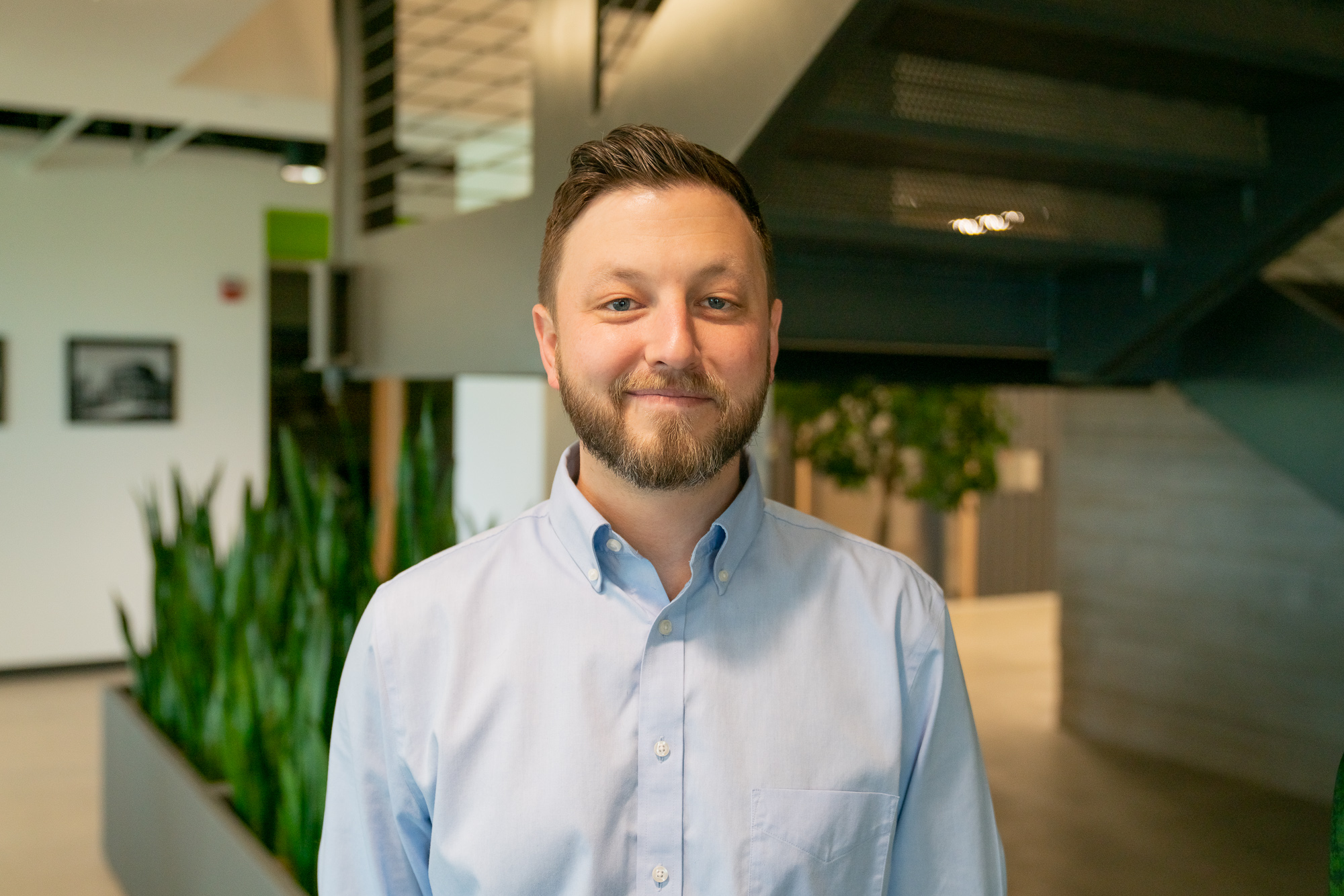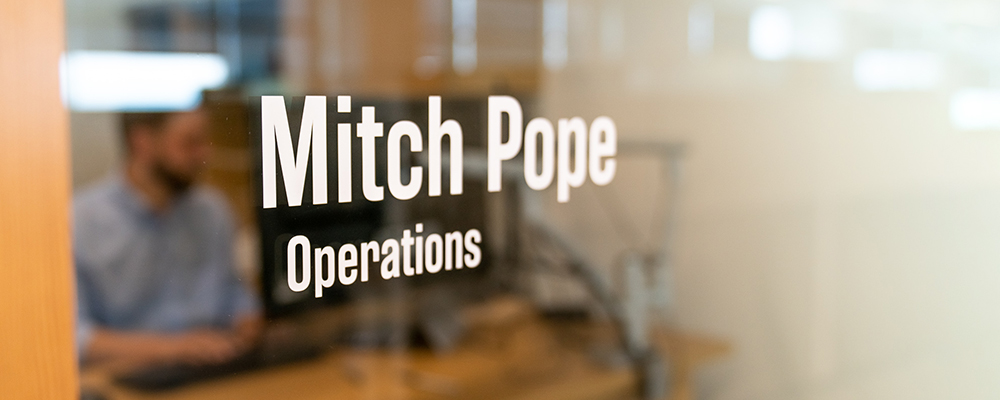After seven years at Extra Space Storage, it’s no surprise that Mitch Pope, Senior Director of Operations, knows a thing or two about solving problems.
Pope’s role revolves around optimizing operations at both the corporate and field levels. Acting as the liaison between corporate and field operations has its own unique set of challenges, but factor Extra Space Storage’s size into that, and it only amplifies the magnitude of what it means to coordinate communications at this scale. With more than 1,700 Extra Space Storage facilities throughout the nation, Pope strives to find efficiencies and maintain policies and procedures. This not only mitigates risk, but it also works to streamline and optimize the business that Extra Space Storage does.
Recently, Pope joined us to talk about his career journey, operations role at Extra Space Storage, and the advice he’s picked up along the way.
Q: How did your background prepare you for an operations role?
A: I have a background in Learning Design. I was a content manager and during that time created learning and development training material. This ultimately led me to Extra Space Storage on the Learning & Development team at the Store Support Center.
When asked where I saw myself growing into the company, I said that I wanted to continue in Learning & Development. I was told that I would need to spend time in the field as a Division Learning Manager if I wanted to continue my career in Learning & Development. A year later, I was fortunate enough to receive an offer to be a Division Learning Manager in Chicago.
Working in the Learning & Development side, I was able to better understand the learning and training needs for the field. Spending time in the field working directly with the stores enabled me to understand the technical needs and day-to-day operations. It was valuable because gaining experience in both settings really helped prepare me for my operations role today. There’s no substitute for experiencing the day-to-day things that happen in our stores. It’s hard to substitute for what you learn from time in the field.

Q: What’s the best advice you’ve received in your career?
A: While in Chicago, I was given an opportunity to interview for a District Manager position. Even though I interviewed, I wasn’t totally sure I wanted to accept the position because I intended to continue down the Learning & Development path and didn’t see a District Manager position as a step toward that goal.
But it was at that time the Division Vice President said to me: “Field experience is always helpful. You may think you understand our business, but you’re like someone attending a swimming event who thinks they’re a swimming expert because you can see how it’s being done, but you can’t really learn how to swim unless you spend time in the pool…They might think they know how to do it, but you can’t really know how until you get in and get experience doing it.”
An athlete doesn’t just jump in the pool and immediately know how to do it. They spent time getting to the point they’re at, meaning I wasn’t going to be able to just jump into the career I wanted. I was going to have to get into the pool and spend the time doing the reps.
Q: Which skill set would you say has helped guide you throughout your career path?
A: Being curious helps. It helps you adapt. If you are genuinely interested in learning things, you are going to be more adaptable to change and innovation. I think you also need to be willing to take risks and be flexible.
Q: What does successful communication mean to you when working with different departments?
A: Being clear and intelligible. Most of my communication between departments happens in the form of a shared project or something we roll out to the field, so making sure I am communicating the details so that there is no room for ambiguity is important. You also want to be honest and transparent. With any change taking place across multiple stores and people, it’s important to communicate “the why.” You need their support to make it work, and people will naturally interpret the communication their own way, so getting as clear as you can on the details of what’s going on is the goal. It improves their ability to accept the change is happening and trust the process.
Q: Have you ever successfully executed a cost-cutting strategy? If so, what has that taught you?
A: We recently completed a waste removal “Right Size” project to make sure we are efficiently utilizing our dumpster services at our facilities. Some of the things I learned from this project are that it’s important to have reporting in place and do a post-evaluation of the strategy implemented and ask yourself if there were any unintended consequences.
It can often be the case that you’re cutting work in one area but creating more work in another—or cutting cost in one area and incurring more costs in another. Any time you implement something, make sure to track the results of change. Ideally, start with a small test group because there’s fewer variables, but you need a way to track the long-term impact of that change.

Q: In your opinion, what’s the best way to organize a diverse group of people to accomplish a task?
A: Have a clear vision of what you want to achieve and then communicate it. They need to understand why, then they can problem solve in their own area. Then, hold everyone accountable and measure progress with regular follow-ups and tracking toward the goal.
Q: Which experience(s) in your career influenced who you are today?
A: While I was working as a District Manager in Chicago, I received some critical feedback from the Division Vice President that differed from how I thought I was doing performance-wise. I was not used to receiving feedback in such a direct way, but once I wrapped my head around it and embraced it, it turned out to be a gift, and it was a real turning point in my career.
After this experience, I saw my current position differently. It changed my perception of complacency to realizing that I had a lot of work to do to get ready for my next role, and I ended up really learning a lot and enjoying the rest of my time in that position.
Q: What has been the most challenging aspect of your career?
A: I’d say overcoming personal weakness and cultivating patience—allowing the organization to define needs and then seeing if I can meet those needs as opposed to creating a timetable in my head and forcing opportunity.
Q: Do you have any advice for future Extra Space Storage leaders?
A: Stick to our values, live them, and communicate them often. Given that we are all from diverse backgrounds and geographic areas, it’s critical that we all know the non-negotiables. I think that’s the most essential thing leaders do—help people connect to the company and what we’re trying to do.
Learn more about the executive leaders and Board of Directors growing Extra Space Storage into a self storage leader. Or find out how to join the team today!

